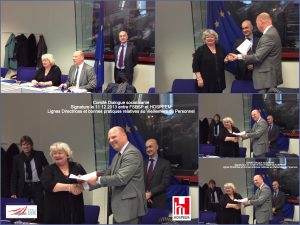HOSPEEM-EPSU Joint Project on Tackling Staff Shortages and Ensuring Future-Proofing Skills in Health
Start Date: 01 April 2025
Duration: 24 Months
Description of the project:
Tackling Staff Shortages and Ensuring Future-Proofing Skills in Health (TaSSEFSH) is a joint project between the European Federation of Public Service Unions (EPSU) and the European Hospital and Healthcare Employers’ Association (HOSPEEM), representing at European level national employers’ organisations in the hospital and healthcare sector.
The aim is to collect and exchange good practices from social partners across Europe that address the massive challenges posed by increasing staff shortages that most health providers face. They are finding it difficult to recruit new staff and to retain skilled and experienced workers. The demographic trends in most countries are driving increased demand at the same time as large cohort of health workers come up for retirement. Understanding the different dynamics and consequences of labour shortages and future-proofing skills in the hospital and healthcare sector at play matters across Europe to deliver quality care, now and in the next decennia. The evolving landscape of the healthcare sector requires support for skills, training and education.
Through a series of six meetings involving trade unions and employers from across Europe the project will explore the various factors behind labour and skills shortages and exchange good practices. An external consultant will be contracted to follow the project, report on all the meetings and draft a final briefing that will summarise the key debates and focus on the potential solutions.
The discussions and debates will cover:
- Ageing of the healthcare workforce: In 11 countries of the European region, a significant demographic shift is imminent as at least 40% of doctors are aged over 55 and are expected to retire in the coming decade. The European Commission Ageing Report 2021 highlights Italy as having the highest participation rate among older population in 2019 with one of the highest percentages of health workers aged 50 and above at 42%, compared to the European average of 36%. The meeting will debate how to attract and retain experienced healthcare workforce while fostering the recruitment of young healthcare professionals. It will include case studies provided by EPSU and HOSPEEM member organisations.
- Intra-EU mobility and migration: The free movement of labour stands as an achievement of the European Union, aligning with the principles of the European Pillar of Social Rights promoting labour mobility across borders. While some countries experience a negative impact from labour migration, others benefit from the enhanced workforce mobility and cross-border collaboration. Factors such as social benefits, level of pay, working conditions, skills development can play pivotal roles in shaping the healthcare workforce landscape. Additionally, language proficiency serves as a compelling incentive, as evidenced by countries like Ireland leveraging language requirements to attract healthcare professionals. Despite investing in training their health workforce, some countries, especially in Eastern and Central Europe experience staff shortages due to healthcare workers deciding to move to another country. EPSU and HOSPEEM agreed on guidelines for ethical cross-border recruitment in 2008 and this project will contribute to the renewal of the commitment of social partners to promote, guarantee and defend decent recruitment and working conditions for workers from and outside the EU. The workshop will explore what can be done to inspire workers to stay in their country of origin and to support migrant workers and intra- EU mobile workers in receiving countries.
- Temporary work agencies: In order to deal with staff shortages EU policymakers need to consider the role of a diverse workforce, including private employment agencies that have placed 12.4 million people in labour markets in Europe (11.2 million participated through temporary agency work which had implications for the labour market). Many EU Member States find themselves compelled to use the services of temporary work agencies and thus often compensate for the staff shortages in hospitals. Although temporary work agencies can improve the situation with limited work capacity of healthcare professionals, some countries are experiencing a situation in which companies are exploiting the scarcity of healthcare profiles to establish profitable businesses. For instance, temporary staffing companies actively recruit nurses who are currently employed on permanent contracts, offering them additional benefits on top of their current salary, and allowing them to demand more regarding their schedules. This leads to unequal salary and working conditions between permanent and temporary staff in the workplace. The workshop will consider how the health care sector can become more resilient and make relations with the temporary work agencies more balanced again and what alternatives can be provided by the health sector.
- Digitalisation: During the pandemic digitalisation helped reduce exposure to the virus and ease administrative burdens. The Social Partners underline that digitalisation will never replace human care delivery. Instead, it can lighten the workload, which can create more time for effective and quality care. The workshop will focus on how digitalisation and AI can softenstaff shortages and support health staff in doing their job while ensuring the protection of workers and patients.
- Future-proofing skills and career pathways: Future-proofing skills and career pathways for the healthcare workforce is crucial in order to navigate in evolving landscape of the sector. The EU action plan on Labour and Skills shortages includes support for skills, training and education as one of the key policy areas to tackle staff shortages. Emphasising continuous learning and developing soft skills can improve patient-centred care and create a pool of well-trained and motivated healthcare workforce. The corresponding Joint Declaration on Continuous Professional Development and Life-long Learning signed by HOSPEEM and EPSU in 2016 acknowledges the connection between investments in LLL and CPD and improving the quality of training, which in turn improves the attractiveness of the sector.
- Practical solutions in collective bargaining: Collective bargaining addresses the multifaceted challenges facing the healthcare workforce. Practical solutions can be identified and implemented to improve working conditions and enhance job satisfaction. The workshop will consider how social partners can design innovative solution to address staff shortages through collective agreements.
- Work-life balance: The updated Framework of Action on Recruitment and Retention agreed between EPSU and HOSPEEM called for Member States to develop supporting infrastructures to facilitate work- life balance in a 24/7 service delivery context. It also said that to facilitate the full participation of men and women in the labour market, healthcare employers and social partners should take measures and develop policies that will improve workers’ work-life balance. The workshop will discuss the measures that social partners and governments have introduced to increase retention of personnel.
- Mental health: The pandemic put more stress on health workers, with many of them reporting burnouts or considering leaving the sector. The sector is not resilient with a health workforce reporting stress overload. This workshop will exchange on good examples on mental health support for healthcare workforce and what impact it has on staff retention.








Recent Comments